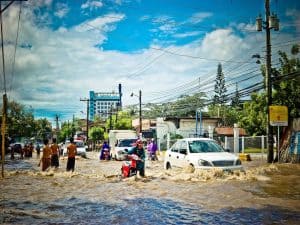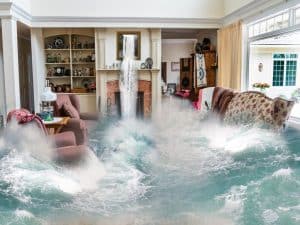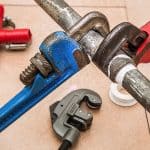While we are all as careful as possible not to cause damage to our homes; there are many natural disasters out there that we can’t control. In the case of blizzards, or heavy rains – you’re not exactly dealing with something you can prevent. Of course, what you can do is prepare for natural disasters as much as possible; especially if you live in an area that’s prone to them. For example – what are some of the steps you can take to protect your home from flooding? Don’t worry – we’ll give you some useful advice on making your home at least partially flood-proof. And remember; flooding can also occur because of pipe bursts, and other technical malfunctions. Which only makes preparing for that eventuality even more important!
When should you protect your home from flooding?
Okay, so before we go into the measures to protect your home from flooding, we should deal with one key question; are you at risk of flooding at all? While we’ve mentioned that everyone is one burst pipe away from reacting to in-house flooding, some people are obviously at more risk than others. And those would be people that live in areas prone to natural disasters that cause flooding as well. So, before you consider what steps you need to take regarding damage prevention; it’s worth taking a look at just how much jeopardy you’re in, geographically.
Finding out if you’re at risk
So, we’ve established that your risk of floods largely depends on your geographic location. Or, in other words – on the part of the country you’re currently living in. Which is why you want to take a look at the government flood maps, to see if your home is currently in any long-term or short-term risk of flooding. For example, if you’re situated somewhere in the South of the country, where hurricanes are pretty much a common occurrence; knowing how to protect your home from flooding situations is important.

Long-term logistics
If you’re certain that you’re in a flood-prone area, and may be dealing with flood damage insurance claims in the near future; you’ll want to minimize the property damage to your household, with some precautionary measures to protect your home from flooding. Don’t worry – if you think about this on time, you’ll be able to weather the storm; both figuratively and literally. So, first of all – in risky areas, there is usually some kind of local communal warning systems. Start by asking around with your neighbors, and researching online; make sure you’re a part of that program.
Also, speaking of research – you should read up on all the different kinds of flooding that can occur. For example; if flash floods are something that happens in your area often, you’ll need to learn how to react quickly and decisively. And furthermore – you’ll need to learn how to spot the earliest signs of an oncoming flood, to buy yourself as much time as possible. Plus, if you’re really dealing with flash floods; always have some contingency food handy in your home, just in case. Finally – plan out an evacuation route in case of a flood. Once you hear a flood emergency alarm from the authorities; there will be no time to waste.
Preparing the essentials
Naturally, if you’re going to protect your home from flooding; you’ll need to be completely prepared in case of such an emergency. And that doesn’t just mean preparing your home, or learning about the best public adjuster Florida has; it also means preparing yourself. Indeed, you’d be surprised at just how many essential things we don’t think of in emergency situations; sometimes with dire consequences. So, if you believe you’re at risk from floods; prepare an essential kit with some emergency items.
For example – a small emergency medical kit should be a part of this, with bandages and similar medical equipment. And make sure you keep this in a place you can easily reach, in the case you need it quickly. Also, keep some essential clothes and toiletries in your emergency flooding kit; you never know if you’ll need to be out of your home for some time, while potential repairs are ongoing. And seeing as we’ve mentioned medical things you might need; if you or your family members take any medication on a daily basis, pack some reserves in your essentials bag. You might end up needing it during an emergency flood situation.

Dealing with an ongoing flood
Unfortunately, you might end up in a situation where you can’t evacuate from your home, as a flood approaches. In that scenario, you’ll need to learn to some emergency measures to protect your home from flooding; at least for the time being. So, for starters; gather some sandbags to cover spots where water might come in. If you don’t have enough for everything, the entrance to your home is the priority. Also, leave at least one sandbag for your toilet; you’ll want to prevent any sewage flowing out under pressure.

But most importantly – if you spot a flood coming, switch off your gas and your electricity right away, if you’ll be forced to stay in your home. Trust us – you don’t want water and electricity combining, especially in an emergency situation you can’t completely control. Finally – no matter what happens or what your instincts might be; avoid coming into contact with the flood water. If you’re trapped in your home for a prolonged amount of time, you may not be able to attain dry clothes. So if you do have to get wet – try to have some rubber boots and extra clothes handy first.





